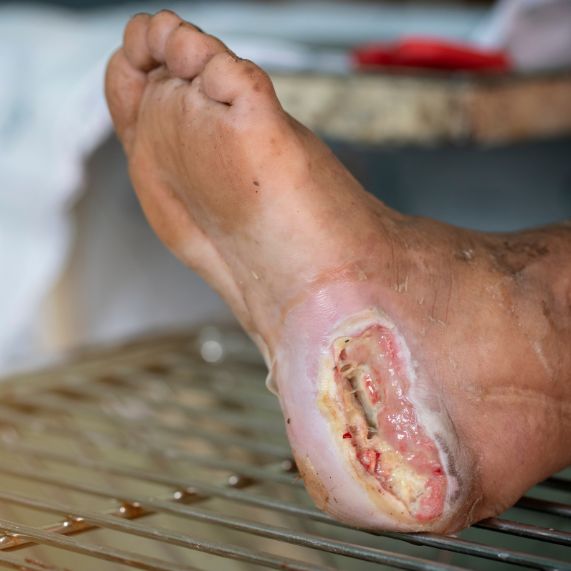In some cases, conservative treatments such as wound care, antibiotics, and offloading (relieving pressure from the affected area) may not be enough to heal foot ulcers and prevent further complications. In these cases, surgery may be necessary to remove infected or dead tissue, restore blood flow, and promote healing.
Meet Dr Viswanath S who is one of the Best Diabetic Foot Surgeons in HSR Layout and Sarjapur Road, having 20+ Years of Experience in this field.

What is Diabetes Foot Care?
If you have diabetes, having too much glucose in your blood for a long time can cause some serious problems, including foot problems.
How Can Diabetes Affect My Feet?
Diabetes can cause two issues that can affect feet:
1. Diabetic neuropathy :Diabetes which are uncontrolled can damage your nerves. If you have damaged nerves in your legs and feet, you might not feel there heat, cold, or pain. This lack of feeling is known as "sensory diabetic neuropathy." If you do not feel a foot cut or sore because of neuropathy, the cut could get worse and become infected. The foot muscles may not work properly because nerves to the muscles are damaged. This could cause your foot to not align properly and create too much pressure on foot part.
2. Peripheral vascular disease :Diabetes also affects the blood flow. Without good blood flow, it takes longer for heal a sore or cut. Poor blood flow in the arms and legs is known as "peripheral vascular disease.
What Are Some Common Foot Issues With Diabetes?
- Athlete's foot - Nails Fungal infection
- Calluses - Corns
- Blisters
- Bunions
- Dry skin
- Diabetic ulcers
- Hammertoes
- Ingrown toenails
- Plantar warts
Tips for Diabetic Foot Care
Proper foot care can prevent these common foot issues or treat them before they cause serious complications. Here are some tips for proper care of foot:• Take care of yourself and diabetes. Follow your doctor's advice for nutrition, exercise, and medication. Keep your sugar level of blood within the range recommended by your healthcare provider.
• Wash your feet in Luke warm water every day, using a mild soap.
• Keep checking your feet every day for sores, blisters, redness, calluses, or any other problems. If you have poor flow of blood, it is so important to check your feet daily.
• If the skin on your feet is dry, keep it moist by putting lotion after you wash and dry your feet.
• Gently help in smoothing corns and calluses with an emery board or pumice stone. Do this after your bath or shower, when your skin becomes soft.
• Keep checking your toenails once a week.
• Always wear closed-toed shoes or slippers. Do not wear sandals and do not walk barefoot, even around the living area.
• Always wear socks or stockings.
• Wear shoes that fit well to you. Purchase shoes made of canvas or leather and break them in slowly.
• Always check the inside of shoes to make sure that no objects are being left inside.
• Keep protecting your feet from heat and cold.
• Keep the flowing of blood to your feet.
• If you smoke, stop as soon as possible. Smoking can make issues with blood flow worse.
• If you have a foot problem that gets worse or won't heal, contact yourhealthcare.
• Make sure your diabetes doctor checks your feet during each routine checkup.
• See your podiatrist (a foot doctor) every 2 to 3 months for checkups, even if you don't have any problems of foot.
Signs of Diabetic Foot Problems:
If you have diabetes, contact your doctor if you have any of these issues:• Skin color changes
• Skin temperature changes
• Foot or ankle swelling
• Legs pain
• Feet Open sores that are slow to heal or are draining
• Ingrown toenails
• Corns or calluses
• Skin Dry cracks, especially around the heel
• Unusual Foot odor
Complications of Diabetic Foot Problems
• Infections of skin and bone• Abscess
• Gangrene
• Deformities
• Charcot foot
• Amputation
• Treating diabetic foot ulcers
• Off loading
Your healthcare may suggest wearing certain items to protect your feet:
• Shoes designed for people having diabetes
• Casts
• Foot braces
• Compression wraps
• Shoe inserts to prevent corns and calluses
Medication
surgical process-debridement, AmputationWhen should I see a doctor for Diabetes Foot Care?
If you have diabetes, see your doctor if you have any of these complications:• Changing in skin color
• Changing in skin temperature
• Swelling in the foot or ankle
• Legs pain
• Opening sores on the feet that are slow to heal or are draining
• Toenails ingrown or infected toenails with fungus
• Corns or calluses
• Skin dry cracks, especially around the heel
• Foot odour that is unusual or won't go away

 Doctor Consultation
Doctor Consultation video Consultation
video Consultation 9880822174
9880822174
